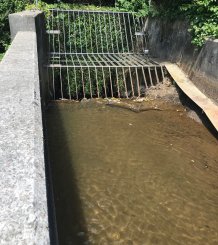
The Red River in West Cornwall
A small, polluted British river will be celebrated through a major new arts project which aims to explore its complex natural ecology, industrial history and continuing impact of those who live near it.
The Red River in West Cornwall runs from Neolithic standing stones on the moors above Camborne to Gwithian in St Ives Bay and has been described as the most 'unnatural' or 'modified' in the UK— all of its seven miles has been altered by tin-mining. While little more than a stream, it has played an important part in Cornwall's industrial revolution and, by extension, the development of hard-rock mining around the world.
Now Dr John Wedgwood Clarke, from the University of Exeter, will explore the impact of the river on the environment and local communities. During a new Arts and Humanities Research Council-funded project he will write a new poem inspired by its polluted state that questions what we think to be natural and unnatural. A soundscape version of the poem will be played in galleries and heritage sites in the area.
Educational materials will also be produced to show how the public can be involved in confronting rubbish, environmental damage, and the human/nature relationship. Dr Clarke will run creative-writing and sound-walk workshops for children and adults along the Red River, and produce teaching resources for local schools in partnership with Kernow Education Arts Parternship (KEAP).
The poem and project will also be influenced by archaeological findings, historical documents, and discussion with local community groups, schools, and museum and arts organisations, including CAST in Helston. Dr Clarke will interview experts in aquatic ecology, social history and mining, including academics from the University of Exeter's Marine Ecology Conservation Network.
At the end of the project local people, artists and experts will take part in a "Parliament of Waste" event, where they will debate the environmental impact of pollution and waste on health and wellbeing, and take part in creative workshops and walks.






